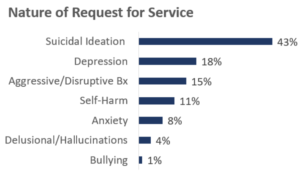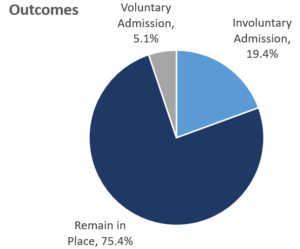The Virtual Crisis Care program offers intervention and support to people on what may be their most challenging day.
Virtual Crisis Care is a mobile crisis response model utilizing telehealth technology to:
► Connect people to timely, professional, and appropriate care regardless of where they live
► Reduce emergency mental illness holds and unnecessary hospitalizations
► Reduce law enforcement transports and wait times for in-person assistance or hospital admission
► Address behavioral health staffing shortages
CJI has provided planning and facilitation between law enforcement and behavioral health professionals, consultation, and implementation assistance for Virtual Crisis Care since its inception.
“This program is an effective and valuable resource for law enforcement and communities. The ability for law enforcement to connect people in crisis virtually with a behavioral health professional means anyone can receive the care they need when they need it. CJI continues to be a part in helping more jurisdictions plan for and activate this program because we know it can have an immediate, positive impact on people and safety.” – Barbara Pierce, CJI Director of Justice Initiatives.
What does the Virtual Crisis Care program include?
► 24/7 access to behavioral health professionals who assist law enforcement responding to calls related to mental health crises
► A single provider to overcome regional behavioral health staffing shortage challenges and differing crisis call volumes
► Virtual support with de-escalation, stabilization, and safety assessments
► Local mental health provider outreach for follow-up care
SPOTLIGHT ON SOUTH DAKOTA
South Dakota’s Virtual Crisis Care program pilot started in January 2020 with 18 sheriffs’ offices and a probation department in a rural judicial circuit. This pilot program was funded by the Leona M. and Harry B. Helmsley Charitable Trust and was a partnership between the South Dakota Sheriffs’ Association, Unified Judicial System, Avera eCare, and CJI. With a legislative appropriation starting July 2021, the state continued funding of the initial pilot sites and expanded the program to an additional 14 sheriffs’ offices and police departments.
The following data is from January 2020 through June 2021.
Eight of every 10 people in crisis are diverted from involuntary hospitalization


For more information about Virtual Crisis Care, contact:
Barbara Pierce | bpierce@cjinstitute.org